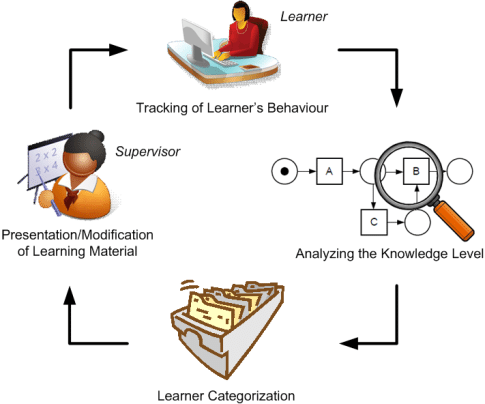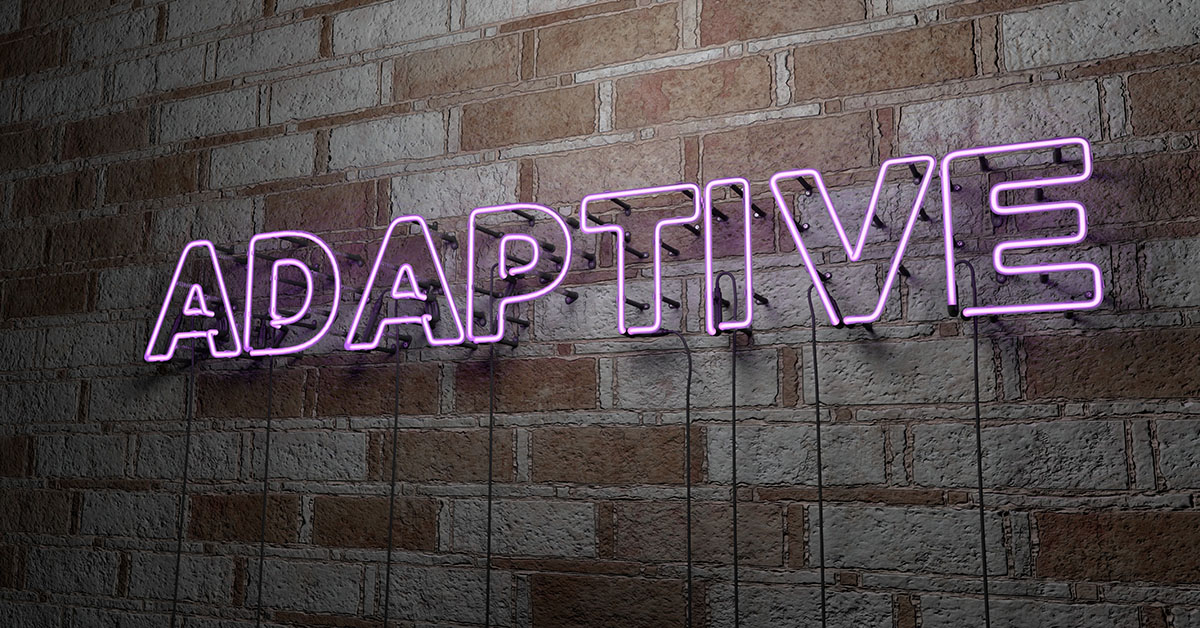- 7 MIN READ -
Here's how adaptive learning works, and why Totara Learn LMS (plus a number of other LMS platforms) is the best tool for building an adaptive corporate training program.
 Tenuous metaphor time: the Hogwarts staircases change position depending upon which class Harry Potter has next. This results in a personalized pathway through the educational space—all part of the magic of eLearning! (Source: Moving Stairs GIF, Tenor.com).
Tenuous metaphor time: the Hogwarts staircases change position depending upon which class Harry Potter has next. This results in a personalized pathway through the educational space—all part of the magic of eLearning! (Source: Moving Stairs GIF, Tenor.com).
In this article, we'll discuss:
- What exactly is Adaptive Learning?
- How can I use Totara Learn (LMS) to deliver Adaptive Learning?
- What are the bottom-line benefits of Adaptive Learning?
What exactly is Adaptive Learning?
Individual learning pathways
Adaptive learning is a term for educational strategies that mould lesson content and structure to appeal to learner preferences and needs.
This ‘moulding’ might be achieved by optimizing teaching materials for things like individual skill level or past experience, or it might be achieved through a dynamic curriculum, which shifts according to how a learner is progressing through a course.
Most often, these adaptations are handled by an artificial intelligence system (AI). The majority of adaptive eLearning systems use machine learning AI, where software collects user-data and analyzes the inputted information to continually update the way a course appears.
It sounds harder than it is, and you can find your step-by-step guide right here to make Developing Learning Plans with Totara Learn LMS as easy as possible
Tailored training
If the adaptive learning software recognizes a student is struggling—perhaps by repeatedly inputting the wrong answers to a quiz—it will engage a pre-determined routine, dialling back the difficulty, supplying hints, or suggesting that the student go back and retake an earlier learning activity.
Likewise, when it becomes clear that a learner is finding content too easy, adaptive learning programs use similar routines to increase the level of challenge, keeping the user engaged.
Things get more complex, too. Alongside performance oversight, adaptive learning software can create nonlinear learning pathways, meaning that the order in which a user tackles activities can change depending on past interactions—what they’ve looked at previously, how they previously engaged, or according to prior qualifications.
Engaged Learners
Through a mix of algorithms, pre and post-assessments, and instructor input, adaptive learning continually maximizes learner engagement by providing materials to learners at the point in a course when they’re most likely to accept them.
Essentially, adaptive learning allows each learner to receive an education specifically tailored to their needs—even when learners are working collaboratively, as part of a class, on in a remote-learning situation.
Still unclear on the ins and outs of adaptive learning? Try our webinar, explaining Why Your Learners Need Adaptive Learning.

These kinds of adaptive cycles are hard to miss once you start looking. From predictive google suggestions to gamified apps, adaption to user-input is a fundamental principle of smart tech (Source: Birgit Schmitz, Supporting Knowledge Construction with Mobile Learning Games).
How can I use Totara Learn (LMS) to deliver Adaptive Learning?
The past few updates of Totara Learn have seen the introduction of some pretty exciting adaptive learning-specific features. Used alone or in combination, they help admins and instructors build flexible learning pathways—thereby widening the reach of eLearning courses.
For some inspiration, here are a few examples of Totara’s adaptive learning features:
Program management
Totara program management is at the heart of adaptive learning in the LMS, giving you the ability to build learner pathways with conditional dividers between course sets (Think basic logical junctions: ‘if’, ‘then’, ‘and’, ‘or’).
So according to the conditions you define, learners will encounter different content at these forks in the road. Completion dependencies for moving on from an activity can also be defined, and the order and flow of the courses learners complete can be manually controlled if necessary.
A Totara program gives learners completion dates and time frames in which to complete each stage of the course. Personalized and automated reminders are a good way of letting learners and their managers know that their next activity deadline is coming up.
Watch a video walkthrough from Totara on how to create a program:
Activity completion tracking
When enabled, activity completion tracking will notify you when learners meet certain conditions (multiple conditions can be set if desired). This means that activities are only considered complete when all of the conditions are met. In Totara, this is symbolized by a tick next to the activity name on the course page.
Adaptive learning comes into play here by making conditions relevant to an activity or learner—maybe the learner needs to view an activity, make a certain grade, meet a deadline, or a combination of conditions in order to continue.
Discover exactly how to bring adaptive learning, completion tracking, and more to your Totara Learn LMS with The Complete Totara Learn User Guide Part 3: Advanced Features absolutely free!
Activity access restrictions
The flip side of using completion settings to build a learner pathway is using Totara’s restrict access functionality (previously known as conditional access). This allows you to set certain criteria that restrict activity or resource visibility. Restrictions can be based on:
- Activity completion
- Date
- Grade
- Audience
- Position
- Organization
- Language
- Time since activity completion
- Group
If you want to create a more complex set of access conditions, the Restriction set button allows for nesting of multiple restriction criteria.
Need to go back a step with Totara? Try our Totara User Guide Part 1: Getting Started for the basics on Totara Learn LMS.
 Automatically matching learners to the most relevant content is an efficient way of increasing eLearning ROI (Source: flickr.com, CC-by-2.0).
Automatically matching learners to the most relevant content is an efficient way of increasing eLearning ROI (Source: flickr.com, CC-by-2.0).
What are the bottom-line benefits of Adaptive Learning?
Boost eLearning ROI
Adaptive learning suits corporate training environments because it gets straight down to what really works. When time and resources are pressured, it makes sense to optimize—cutting out activities that don’t contribute to retention or understanding. As a result, adaptive learning creates extra space in training sessions for learners to focus on the most engaging challenges.
Thanks to these benefits, adaptive learning not only decreases the need for re-training, but improves a company's eLearning ROI by increasing efficacy.
|
How does Totara enable this benefit? There are multiple options for building time-saving adaptations into your content with Totara. For example, use audience visibility options to choose which group of users can see a program in the course catalogue. Totara Audiences and hierarchies give admins flexibility in how they tag and categorize learners, meaning that learner cohorts can get super-specific. You might have visibility preferences set up so that new onboards in a particular region take one induction pathway, while those taking inductions in another area (perhaps where different regulations result in changes to training) will see a different set of content. For more on how to use Totara audiences and hierarchies, see The Complete Totara Learn User Guide Part 2: Basic Features |
Flexible corporate training
Adaptive learning helps resolve the day-to-day timing, scheduling, and employee engagement challenges faced by training departments. For example, because adaptive learning works best with eLearning platforms, trainers don’t necessarily need to be present for learning activities.
A 2008 review of studies on adaptive learning confirmed this view of adaptive learning’s flexibility solutions, finding that the approach “imitates the one-on-one learning process between teacher and student, but [adds] new facilities and utilities taking advantage of the technology.”
|
How does Totara enable this benefit? Certifications allow learners to self manage their learning, supporting flexibility, while keeping them up to date with mandatory deadlines, qualifications, compliance needs, etc. Certifications are similar to programs—both facilitating adaptive learning through completion dependencies—but unlike programs, certifications are only valid for a certain period of time. After then, the LMS will prompt learners to re-certify. |
Better results from online training programs
A study on the effectiveness of adaptive learning looked at students using adaptive learning to complete a large, multi-section introductory IT course. After studying content adapted through pre and post-assessments, the class showed a significant improvement in grade distributions, pass/fail rate, and qualitative increases in the efficiency of instructor time and effort.
These training benefits are available no matter the scale of learning at hand. However it’s used, adaptive learning makes users’ study time more efficient, reducing the time spent on topics already understood by students, and increasing exposure to complex topics.
Here’s the full rundown on the features available in Totara Learn’s latest update: Totara Learn 12 - More Powerful, Easier to Use.
|
How does Totara enable this benefit? Totara’s nitty-gritty tech features are specifically designed to improve outcomes in corporate training environments. For instance, adaptive Question behaviours give learners multiple attempts to answer a question before moving on. Questions can adapt themselves to learners’ answers by giving hints and then asking learners to try again. Other features enable fine-grain adjustments over time, resulting in the most optimized learning experience possible. Split test or trial different adaptive settings, such as question types—controlling the format and answer options available in a quiz or lesson activity. |
Are you interested in building an online training program using adaptive learning? We'd love to help! Lambda Solutions specializes in helping corporate companies and academic institutions develop the most dynamic eLearning experiences possible. Get in touch today.





